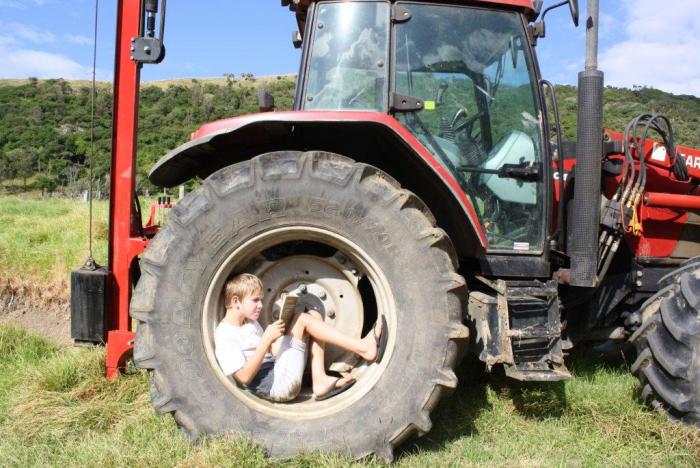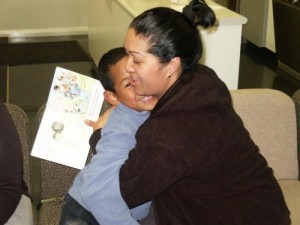“Parents or other family and whānau members are the most important people for helping to keep children reading over the holidays. Children who read over the summer holidays can avoid the “summer slide” – when they lose the reading achievement they made during the school year…”
http://schools.natlib.govt.nz/creating-readers/summer-reading/families-supporting-summer-reading
SO come to our Whānau Day on the last day of term and check out Te Rapunga – Raglan Area School’s amazing space for your library reading pleasure. Returning students and each member of their family, can get out 5 books out each(!) for the Summer holidays, if they bring in an adult from their whanau!
This boy in the tractor was from a school summer reader in Ahipara! Where will you be reading? Email us photos of your children reading over this summer, if you wish!
———————————————————————————————–
From Tuesday 24 November…Next week –
 Return ALL library books before Friday 27 November
Return ALL library books before Friday 27 November
- Come and make Christmas Decorations in Te Rapunga
———————————————————
From Tuesday 1 December … Second to last week –
- Main library closed for stocktake
- Special ‘Christmas Library’ opens for one day teacher borrowing
——————————————————————-
WHANAU DAY in TE RAPUNGA!
Bring your whanau to the library, show them around and get some books out for the Summer Holidays
· Take home your Christmas decorations.
Read on …
From : http://schools.natlib.govt.nz/creating-readers/summer-reading/families-supporting-summer-reading
“Why summer reading matters
Children and teens who don’t read much over the long summer holidays fall back in their reading levels and fluency. This is true of all children, but especially for children who are already struggling readers. Children who keep reading over the summer holidays can avoid the “summer slide” and may even make reading gains for the start of the next school year.
Parents, or other family and whānau members don’t have to do what a teacher does. But, they can help make sure children and teens have something enjoyable to read. Even ten minutes a day reading can make a big difference!
How parents and whānau can keep children reading over the summer
Know about the “summer slide”
- Know that as well as reading, it is great to just share books, look at the pictures, and to talk about what children or teens are reading
- Know what the reading tests show at the end and beginning of the school year
- Understand how important it is for children /teens to read every day to maintain skills
Provide plenty of fun and easy reading material
- Allow children to choose what they read. Easy reading is ok – the habit, enjoyment and mileage makes more difference than difficulty level
- Help children choose “just right” books
- Visit the public library, choose plenty of books to borrow and share, and ask the advice of a librarian
- Join the summer reading programme at the public library if available
- Link to public libraries summer reading page
- Talk to the school library staff for advice and resources about holiday reading
- Link to the school libraries summer reading page
- Try a variety of reading material such as books, comics, magazines, and audio books
Make time for reading each day
- This might be quiet time for children to read alone – it could be for 15 minutes, or perhaps three lots of five minutes a day
- Include reading aloud at bedtime
- Learn how to listen to children reading aloud – what to do and not do to help them
Be a reading role model
- Show children that reading is fun and important
- Know how important it is for boys to see male reading role models, especially dads and other whānau
- Talk about the reading we do all through the day – signs, recipes, instructions, and share what children are reading
- Encourage children to share / retell family stories
- Manage how much TV, gaming and other screen time children have
- Include some enjoyable literacy activities in the holidays, such as reading recipes or making a scrapbook
Download the Help your child become a reader brochures below – available in English, Māori, Cook Island Māori, Samoan, Tongan, Niuean and Tokelauan. These provide tips and strategies for parents and whānau to read together with their children, with a focus on reading for pleasure.
Further information
- Check out the Book sorter, on the UK Summer Reading Challenge website for ideas on books for children.
- Find out some tips for getting kids reading over the summer from this great infographic.|
- Watch this 15-minute online tutorial from Canda’s National Reading Campaign site on how parents can help support school libraries, encouraging “reading engagement and information literacy with their children”.
- Words for Life from the UK National Litearacy Trust has a range of great reading ideas and activities for children up to age 11. “
Image: Reading Together at the Kaikohe Family Literacy Day summer 2014, by Jeannie Skinner



Recent Comments